Topics Read online
Page 5
Then look also at the case of the contraries of S and P in the thesis, and see if the contrary of the one follows upon the contrary of the other, either directly or conversely, both when you are demolishing and when you are establishing a view: secure arguments of this kind as well by means of induction, so far as may be required. Now the sequence is direct in a case such as that of courage and cowardice: for upon the one of them virtue follows, and vice upon the other; and upon the one it follows that it is desirable, while upon the other it follows that it is objectionable. The sequence, therefore, in the latter case also is direct; for the desirable is the contrary of the objectionable. Likewise also in other cases. The sequence is, on the other hand, converse in such a case as this: Health follows upon vigour, but disease does not follow upon debility; rather debility follows upon disease. In this case, then, clearly the sequence is converse. Converse sequence is, however, rare in the case of contraries; usually the sequence is direct. If, therefore, the contrary of the one term does not follow upon the contrary of the other either directly or conversely, clearly neither does the one term follow upon the other in the statement made: whereas if the one followed the other in the case of the contraries, it must of necessity do so as well in the original statement.
You should look also into cases of the privation or presence of a state in like manner to the case of contraries. Only, in the case of such privations the converse sequence does not occur: the sequence is always bound to be direct: e.g. as sensation follows sight, while absence of sensation follows blindness. For the opposition of sensation to absence of sensation is an opposition of the presence to the privation of a state: for the one of them is a state, and the other the privation of it.
The case of relative terms should also be studied in like manner to that of a state and its privation: for the sequence of these as well is direct; e.g. if 3/1 is a multiple, then 1/3 is a fraction: for 3/1 is relative to 1/3, and so is a multiple to a fraction. Again, if knowledge be a conceiving, then also the object of knowledge is an object of conception; and if sight be a sensation, then also the object of sight is an object of sensation. An objection may be made that there is no necessity for the sequence to take place, in the case of relative terms, in the way described: for the object of sensation is an object of knowledge, whereas sensation is not knowledge. The objection is, however, not generally received as really true; for many people deny that there is knowledge of objects of sensation. Moreover, the principle stated is just as useful for the contrary purpose, e.g. to show that the object of sensation is not an object of knowledge, on the ground that neither is sensation knowledge.
9
Again look at the case of the co-ordinates and inflected forms of the terms in the thesis, both in demolishing and in establishing it. By co-ordinates' are meant terms such as the following: 'Just deeds' and the 'just man' are coordinates of 'justice', and 'courageous deeds' and the 'courageous man' are co-ordinates of courage. Likewise also things that tend to produce and to preserve anything are called co-ordinates of that which they tend to produce and to preserve, as e.g. 'healthy habits' are co-ordinates of 'health' and a 'vigorous constitutional' of a 'vigorous constitution' and so forth also in other cases. 'Co-ordinate', then, usually describes cases such as these, whereas 'inflected forms' are such as the following: 'justly', 'courageously', 'healthily', and such as are formed in this way. It is usually held that words when used in their inflected forms as well are co-ordinates, as (e.g.) 'justly' in relation to justice, and 'courageously' to courage; and then 'co-ordinate' describes all the members of the same kindred series, e.g. 'justice', 'just', of a man or an act, 'justly'. Clearly, then, when any one member, whatever its kind, of the same kindred series is shown to be good or praiseworthy, then all the rest as well come to be shown to be so: e.g. if 'justice' be something praiseworthy, then so will 'just', of a man or thing, and 'justly' connote something praiseworthy. Then 'justly' will be rendered also 'praiseworthily', derived will by the same inflexion from 'the praiseworthy' whereby 'justly' is derived from 'justice'.
Look not only in the case of the subject mentioned, but also in the case of its contrary, for the contrary predicate: e.g. argue that good is not necessarily pleasant; for neither is evil painful: or that, if the latter be the case, so is the former. Also, if justice be knowledge, then injustice is ignorance: and if 'justly' means 'knowingly' and 'skilfully', then 'unjustly' means 'ignorantly' and 'unskilfully': whereas if the latter be not true, neither is the former, as in the instance given just now: for 'unjustly' is more likely to seem equivalent to 'skilfully' than to 'unskilfully'. This commonplace rule has been stated before in dealing with the sequence of contraries; for all we are claiming now is that the contrary of P shall follow the contrary of S.
Moreover, look at the modes of generation and destruction of a thing, and at the things which tend to produce or to destroy it, both in demolishing and in establishing a view. For those things whose modes of generation rank among good things, are themselves also good; and if they themselves be good, so also are their modes of generation. If, on the other hand, their modes of generation be evil, then they themselves also are evil. In regard to modes of destruction the converse is true: for if the modes of destruction rank as good things, then they themselves rank as evil things; whereas if the modes of destruction count as evil, they themselves count as good. The same argument applies also to things tending to produce and destroy: for things whose productive causes are good, themselves also rank as good; whereas if causes destructive of them are good, they themselves rank as evil.
10
Again, look at things which are like the subject in question, and see if they are in like case; e.g. if one branch of knowledge has more than one object, so also will one opinion; and if to possess sight be to see, then also to possess hearing will be to hear. Likewise also in the case of other things, both those which are and those which are generally held to be like. The rule in question is useful for both purposes; for if it be as stated in the case of some one like thing, it is so with the other like things as well, whereas if it be not so in the case of some one of them, neither is it so in the case of the others. Look and see also whether the cases are alike as regards a single thing and a number of things: for sometimes there is a discrepancy. Thus, if to 'know' a thing be to 'think of' it, then also to 'know many things' is to 'be thinking of many things'; whereas this is not true; for it is possible to know many things but not to be thinking of them. If, then, the latter proposition be not true, neither was the former that dealt with a single thing, viz. that to 'know' a thing is to 'think of' it.
Moreover, argue from greater and less degrees. In regard to greater degrees there are four commonplace rules. One is: See whether a greater degree of the predicate follows a greater degree of the subject: e.g. if pleasure be good, see whether also a greater pleasure be a greater good: and if to do a wrong be evil, see whether also to do a greater wrong is a greater evil. Now this rule is of use for both purposes: for if an increase of the accident follows an increase of the subject, as we have said, clearly the accident belongs; while if it does not follow, the accident does not belong. You should establish this by induction. Another rule is: If one predicate be attributed to two subjects; then supposing it does not belong to the subject to which it is the more likely to belong, neither does it belong where it is less likely to belong; while if it does belong where it is less likely to belong, then it belongs as well where it is more likely. Again: If two predicates be attributed to one subject, then if the one which is more generally thought to belong does not belong, neither does the one that is less generally thought to belong; or, if the one that is less generally thought to belong does belong, so also does the other. Moreover: If two predicates be attributed to two subjects, then if the one which is more usually thought to belong to the one subject does not belong, neither does the remaining predicate belong to the remaining subject; or, if the one which is less usually thought to belong to the one subject does belong, so too
does the remaining predicate to the remaining subject.
Moreover, you can argue from the fact that an attribute belongs, or is generally supposed to belong, in a like degree, in three ways, viz. those described in the last three rules given in regard to a greater degree.' For supposing that one predicate belongs, or is supposed to belong, to two subjects in a like degree, then if it does not belong to the one, neither does it belong to the other; while if it belongs to the one, it belongs to the remaining one as well. Or, supposing two predicates to belong in a like degree to the same subject, then, if the one does not belong, neither does the remaining one; while if the one does belong, the remaining one belongs as well. The case is the same also if two predicates belong in a like degree to two subjects; for if the one predicate does not belong to the one subject, neither does the remaining predicate belong to the remaining subject, while if the one predicate does belong to the one subject, the remaining predicate belongs to the remaining subject as well.
11
You can argue, then, from greater or less or like degrees of truth in the aforesaid number of ways. Moreover, you should argue from the addition of one thing to another. If the addition of one thing to another makes that other good or white, whereas formerly it was not white or good, then the thing added will be white or good-it will possess the character it imparts to the whole as well. Moreover, if an addition of something to a given object intensifies the character which it had as given, then the thing added will itself as well be of that character. Likewise, also, in the case of other attributes. The rule is not applicable in all cases, but only in those in which the excess described as an 'increased intensity' is found to take place. The above rule is, however, not convertible for overthrowing a view. For if the thing added does not make the other good, it is not thereby made clear whether in itself it may not be good: for the addition of good to evil does not necessarily make the whole good, any more than the addition of white to black makes the whole white.
Again, any predicate of which we can speak of greater or less degrees belongs also absolutely: for greater or less degrees of good or of white will not be attributed to what is not good or white: for a bad thing will never be said to have a greater or less degree of goodness than another, but always of badness. This rule is not convertible, either, for the purpose of overthrowing a predication: for several predicates of which we cannot speak of a greater degree belong absolutely: for the term 'man' is not attributed in greater and less degrees, but a man is a man for all that.
You should examine in the same way predicates attributed in a given respect, and at a given time and place: for if the predicate be possible in some respect, it is possible also absolutely. Likewise, also, is what is predicated at a given time or place: for what is absolutely impossible is not possible either in any respect or at any place or time. An objection may be raised that in a given respect people may be good by nature, e.g. they may be generous or temperately inclined, while absolutely they are not good by nature, because no one is prudent by nature. Likewise, also, it is possible for a destructible thing to escape destruction at a given time, whereas it is not possible for it to escape absolutely. In the same way also it is a good thing at certain places to follow see and such a diet, e.g. in infected areas, though it is not a good thing absolutely. Moreover, in certain places it is possible to live singly and alone, but absolutely it is not possible to exist singly and alone. In the same way also it is in certain places honourable to sacrifice one's father, e.g. among the Triballi, whereas, absolutely, it is not honourable. Or possibly this may indicate a relativity not to places but to persons: for it is all the same wherever they may be: for everywhere it will be held honourable among the Triballi themselves, just because they are Triballi. Again, at certain times it is a good thing to take medicines, e.g. when one is ill, but it is not so absolutely. Or possibly this again may indicate a relativity not to a certain time, but to a certain state of health: for it is all the same whenever it occurs, if only one be in that state. A thing is 'absolutely' so which without any addition you are prepared to say is honourable or the contrary. Thus (e.g.) you will deny that to sacrifice one's father is honourable: it is honourable only to certain persons: it is not therefore honourable absolutely. On the other hand, to honour the gods you will declare to be honourable without adding anything, because that is honourable absolutely. So that whatever without any addition is generally accounted to be honourable or dishonourable or anything else of that kind, will be said to be so 'absolutely'.
Book III
1
THE question which is the more desirable, or the better, of two or more things, should be examined upon the following lines: only first of all it must be clearly laid down that the inquiry we are making concerns not things that are widely divergent and that exhibit great differences from one another (for nobody raises any doubt whether happiness or wealth is more desirable), but things that are nearly related and about which we commonly discuss for which of the two we ought rather to vote, because we do not see any advantage on either side as compared with the other. Clearly, in such cases if we can show a single advantage, or more than one, our judgement will record our assent that whichever side happens to have the advantage is the more desirable.
First, then, that which is more lasting or secure is more desirable than that which is less so: and so is that which is more likely to be chosen by the prudent or by the good man or by the right law, or by men who are good in any particular line, when they make their choice as such, or by the experts in regard to any particular class of things; i.e. either whatever most of them or what all of them would choose; e.g. in medicine or in carpentry those things are more desirable which most, or all, doctors would choose; or, in general, whatever most men or all men or all things would choose, e.g. the good: for everything aims at the good. You should direct the argument you intend to employ to whatever purpose you require. Of what is 'better' or 'more desirable' the absolute standard is the verdict of the better science, though relatively to a given individual the standard may be his own particular science.
In the second place, that which is known as 'an x' is more desirable than that which does not come within the genus 'x'-e.g. justice than a just man; for the former falls within the genus 'good', whereas the other does not, and the former is called 'a good', whereas the latter is not: for nothing which does not happen to belong to the genus in question is called by the generic name; e.g. a 'white man' is not 'a colour'. Likewise also in other cases.
Also, that which is desired for itself is more desirable than that which is desired for something else; e.g. health is more desirable than gymnastics: for the former is desired for itself, the latter for something else. Also, that which is desirable in itself is more desirable than what is desirable per accidens; e.g. justice in our friends than justice in our enemies: for the former is desirable in itself, the latter per accidens: for we desire that our enemies should be just per accidens, in order that they may do us no harm. This last principle is the same as the one that precedes it, with, however, a different turn of expression. For we desire justice in our friends for itself, even though it will make no difference to us, and even though they be in India; whereas in our enemies we desire it for something else, in order that they may do us no harm.
Also, that which is in itself the cause of good is more desirable than what is so per accidens, e.g. virtue than luck (for the former in itself, and the latter per accidens, the cause of good things), and so in other cases of the same kind. Likewise also in the case of the contrary; for what is in itself the cause of evil is more objectionable than what is so per accidens, e.g. vice and chance: for the one is bad in itself, whereas chance is so per accidens.
Also, what is good absolutely is more desirable than what is good for a particular person, e.g. recovery of health than a surgical operation; for the former is good absolutely, the latter only for a particular person, viz. the man who needs an operation. So too what is good by nature is more desirable than the
good that is not so by nature, e.g. justice than the just man; for the one is good by nature, whereas in the other case the goodness is acquired. Also the attribute is more desirable which belongs to the better and more honourable subject, e.g. to a god rather than to a man, and to the soul rather than to the body. So too the property of the better thing is better than the property of the worse; e.g. the property of God than the property of man: for whereas in respect of what is common in both of them they do not differ at all from each other, in respect of their properties the one surpasses the other. Also that is better which is inherent in things better or prior or more honourable: thus (e.g.) health is better than strength and beauty: for the former is inherent in the moist and the dry, and the hot and the cold, in fact in all the primary constituents of an animal, whereas the others are inherent in what is secondary, strength being a feature of the sinews and bones, while beauty is generally supposed to consist in a certain symmetry of the limbs. Also the end is generally supposed to be more desirable than the means, and of two means, that which lies nearer the end. In general, too, a means directed towards the end of life is more desirable than a means to anything else, e.g. that which contributes to happiness than that which contributes to prudence. Also the competent is more desirable than the incompetent. Moreover, of two productive agents that one is more desirable whose end is better; while between a productive agent and an end we can decide by a proportional sum whenever the excess of the one end over the other is greater than that of the latter over its own productive means: e.g. supposing the excess of happiness over health to be greater than that of health over what produces health, then what produces happiness is better than health. For what produces happiness exceeds what produces health just as much as happiness exceeds health. But health exceeds what produces health by a smaller amount; ergo, the excess of what produces happiness over what produces health is greater than that of health over what produces health. Clearly, therefore, what produces happiness is more desirable than health: for it exceeds the same standard by a greater amount. Moreover, what is in itself nobler and more precious and praiseworthy is more desirable than what is less so, e.g. friendship than wealth, and justice than strength. For the former belong in themselves to the class of things precious and praiseworthy, while the latter do so not in themselves but for something else: for no one prizes wealth for itself but always for something else, whereas we prize friendship for itself, even though nothing else is likely to come to us from it.

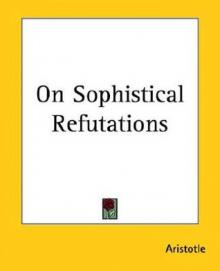 On Sophistical Refutations
On Sophistical Refutations The Categories
The Categories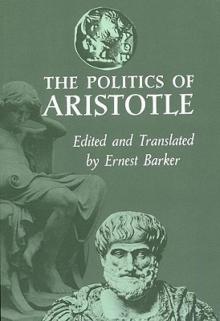 The Politics of Aristotle
The Politics of Aristotle Nicomachean Ethics
Nicomachean Ethics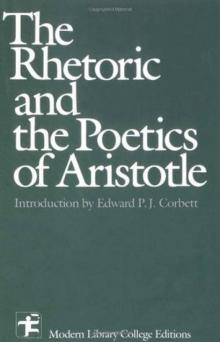 The Rhetoric & the Poetics of Aristotle
The Rhetoric & the Poetics of Aristotle POSTERIOR ANALYTICS
POSTERIOR ANALYTICS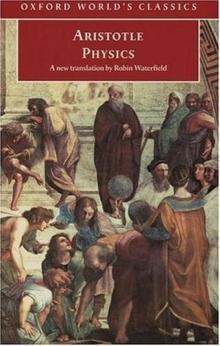 Physics
Physics Metaphysics
Metaphysics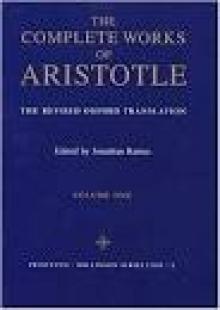 Various Works
Various Works